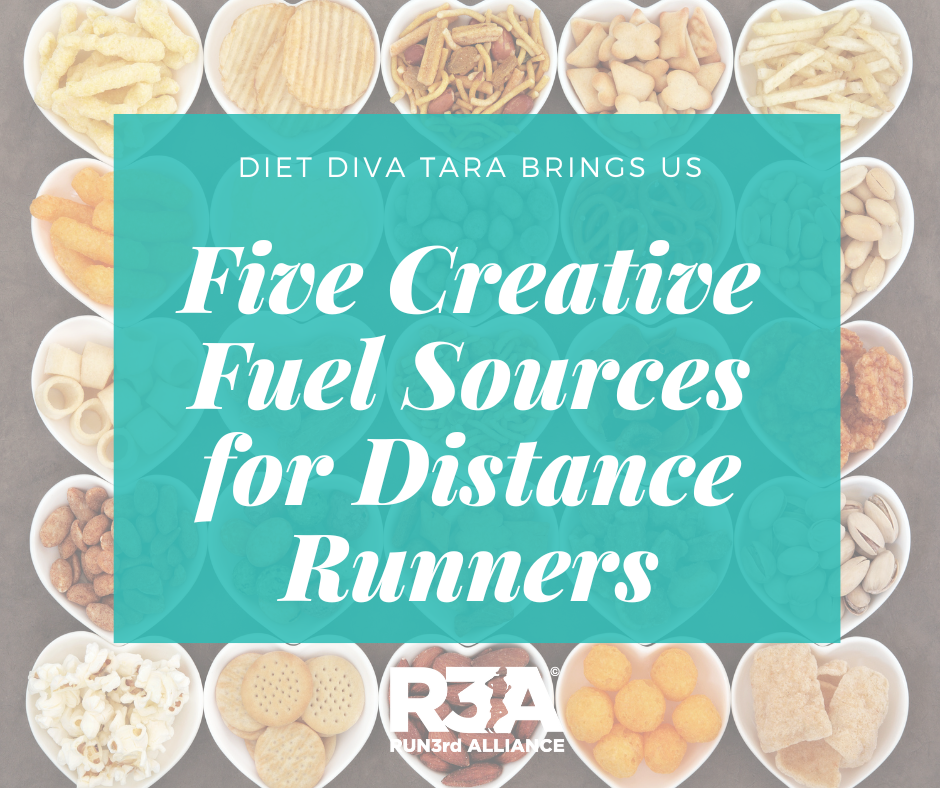
By: Tara Collingwood (www.dietdiva.net)
How should you fuel during your race? Some runners who are on the course for two to three hours may
stay well fueled during their race with just carbohydrate-containing fluids such as sports drinks, but for
those who are on the race course longer may also need solid foods for extra calories. As an endurance
runner, you want the source of fuel during your race to be simple carbohydrates or carbohydrate in the
form of sugar. Sugar eaten before and during long periods of exercise can help with maintaining steady
blood sugar levels, preventing high rates of carbohydrate breakdown, delaying the onset of fatigue, and
improving endurance performance.
The body can use simple carbohydrates for energy quicker than it can use complex carbohydrates, which
take longer for the body to breakdown into energy. Simple carbohydrates include things like sports
drinks, fruit snacks, dried fruits, candy, cookies, white breads, and white rice or pastas. Most sports
drinks have multiple sources of sugar like glucose and sucrose, which are rapidly absorbed and quickly
converted to energy. The sugars in sports drinks have been shown to help athletic performance when
the duration is greater than an hour.
After the first hour of exercise, about 30-60 grams of carbohydrate per hour is recommended. One study
suggested about 90 grams of carbohydrate per hour is ideal for endurance events greater than 2.5
hours. For the runners who may be on the course longer and need a little extra boost on top of your
sports drink, special sport foods such as gels, sports beans, and energy bars are good options. You can
also get a similar benefit from other fuel options listed below.
- Red Licorice: One vine of red licorice has 9 grams of carbohydrate and 40 calories. 3 vines are
equivalent in calories and carbohydrates as an energy gel packet. - Fruit Snacks: Fruit snacks provide calories and simple carbohydrate that will breakdown quickly
in your body. One single serve packet of fruit snacks have about 21 grams of carbohydrate and
80 calories. - Granola Bar: One granola bar has about 25 grams of carbohydrate and 140 calories. Check
labels to see what your brand contains. Choose your granola bars wisely, as some can be higher
in fat which takes longer to digest, and may lead to stomach cramps. - Raisins: Raisins have been shown to be comparable to commercial carbohydrate sport chews.
One box of raisins contains 22 grams of carbohydrate and 90 calories. Other dried fruits can be
used such as dried mango, tart cherries, or cranberries. - Dates: Dates are high in simple sugars and carbohydrates. One Medjool date has about 18
grams of carbohydrate and 66 calories. For some people, the fiber load in dates and other dried
fruits may cause gastrointestinal pain or cramping, so try it out during a training run before you
use it on race day.
Sports drinks include both carbohydrate and electrolytes so if you plan to choose one of the options
listed above it may be beneficial to supplement with a sports drink for the fluid and electrolytes. Water
and a small package of salt could also be used to provide fluids and electrolytes.
Remember, when you try these options for the first time, try them on training days and during practice
first. Pick the ones that work best for you to use on race day.

